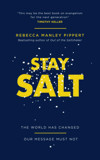
Why did God send his Son, who had been accustomed to all the majesty of heaven, into the world in the weakest, humblest way imaginable—as a helpless, utterly dependent baby who was even laid in an animal trough?
First, because God is turning the demonic lie on its head! To be human—to be dependent—is wonderful in God’s eyes! That is why we must never despise our smallness, since the Son of God became “small” when he became human. His birth is a tremendous validation of how good it is to be human. Christ becoming flesh “hallows all flesh,” as the poet Charles Williams said.
"The fact that Christ came in the utter weakness and vulnerability of a baby has immense significance when it comes to evangelism."
Second, the humble circumstances of his birth are a sign that Jesus didn’t come to save only the privileged and the powerful; he came to save all of humanity.
The fact that Christ came in the utter weakness and vulnerability of a baby has immense significance when it comes to evangelism.
Here’s why: Jesus’ birth reveals that God is pleased to dwell in and reveal his glory through human weakness. That is a theme throughout all of Scripture. All through the Bible we see that there is a profound relationship between human weakness and God’s power.
Consider the apostle Paul, one the greatest evangelists in history.
How did Paul feel as he went on his missionary journey to the important city of Corinth, the “Sin City” of the ancient world? Was he brimming with self-confidence? In 1 Corinthians 2:3-5 we read Paul’s own view—and it gives us an invaluable insight into why recognizing our smallness is actually a gift:
“I came to you in weakness with great fear and trembling. My message and my preaching were not with wise and persuasive words, but with a demonstration of the Spirit’s power, so that your faith might not rest on human wisdom, but on God’s power.”
Paul’s statement is staggering. Paul says he glories in his weakness and inadequacy so that Christ’s power may be revealed. This is the very antithesis of Genesis 3! Satan wants us to detest the fact that being human means we must depend upon God. But Paul says the exact opposite! He says that he has learned to love and celebrate his weakness because through his inadequacy God’s power and grace are revealed.
But how do we learn to live like this? Paul shows us that the answer lies in first accepting our smallness. This is about much more than acknowledging our limitations. It means experiencing a power much greater than our own and surrendering to it.
Learning to accept our humanness is what leads us to depend upon God’s strength. It puts us in a position where we are able to joyfully accept that God has all the strength and power we could ever need, and we don’t—and so we’re going to need his help!
"When we learn to celebrate our smallness and to depend upon the power of God, it affects every aspect of our lives. And that includes our sharing of the gospel."
Someone who has taught me and countless others how to view human weakness through God’s eyes is the renowned author and speaker Joni Eareckson Tada. Joni had a diving accident when she was a teenager that resulted in her becoming disabled with quadriplegia. God has used Joni to be his witness in extraordinary ways ever since.
I have known Joni for a long time, so when she came to speak at our church, I asked her if we could have lunch together, and said I would bring a packed lunch.
As we sat alone together in one of the rooms, it suddenly occurred to me that I would need to help her. So I picked up the sandwich and began to feed her. I put the straw to her mouth so she could drink. I wiped her mouth with the napkin. It’s hard to describe the intimacy of that lunch. The only time I had ever fed anyone was when my children were babies or when I visited my grandmother in her nursing home. In other words, I had only done this for those who were at the opposite ends of the human lifespan.
This time, though, I wasn’t feeding my babies or my grandmother—I was feeding the remarkable, heroic Joni Tada. The act of feeding her felt almost sacred. Somehow her physical weakness caused me to feel at ease with my own human weakness. Before long I began telling her about the challenges I was facing and where I was waiting on the Lord for answers. And she did the same.

Helps Christians to share their faith in today's world confidently and effectively.
I reflected on that experience for a long time afterwards. Why did feeding Joni lunch have such a profound effect on me? Eventually I concluded that it was because I was in the presence of a woman who had made peace with her weakness. The blessing of her physical disability, I have heard her say, is the constant reminder that we are God-dependent and not self-sufficient people.
When we learn to celebrate our smallness and to depend upon the power of God, it affects every aspect of our lives. And that includes our sharing of the gospel.
When we learn to celebrate our smallness and to depend upon the power of God, it affects every aspect of our lives. And that includes our sharing of the gospel—because it diminishes our fears when we realize that it is ok to be inadequate, that being able to answer every question skeptics ask is not required, and, most of all, that our human weakness is no hindrance to God using us for his kingdom to spread the glorious good news.
As Paul said (and it’s what I need to recall every time I share my faith), “[God’s] power is made perfect in weakness” (2 Corinthians 12:9).
So, the next time you consider witnessing to a neighbor or a family member or a work colleague, and you think, “I can’t, because...” don’t let that defeat you. But equally, don’t try to find the confidence or ability within you.
Yes, you’re inadequate. And when you accept that you’re a dependent creature, with a mighty Creator, then you’re in the place where he can use you. We are weak, yet he is strong.
This is an extract from Stay Salt, by renowned evangelist Becky Pippert. The book draws on decades of conversations about Christianity around the world to call and equip ordinary Christians to share Jesus through their ordinary day-to-day conversations.